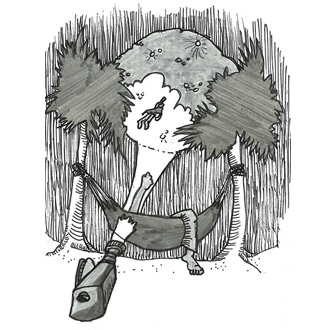
Related Questions
- What makes nerve gas so dangerous?
- Why do our bodies make boogers?
- Must all organisms age and die?
- What are thoughts made of?
- Can hearts, livers, and kidneys be grown in the lab for human transplants?
- Is it possible to control someone’s thoughts?
- Why does our hair turn gray — as opposed to green or some other color — as we age?
- How did life on Earth begin?
- How do glucometers work?
- How do medicines know where in the body to start working?
Is sleep necessary?
Yes — that’s where memories are built
By Meg MurphyLook around so you can remember exactly where you were as you read this answer. Get a good night’s sleep and what you absorb now will hold new meaning tomorrow — in ways you can’t yet imagine. Just dream on it.
Sleep matters. And for reasons more extraordinary than we knew, says Matthew Wilson, Sherman Fairchild Professor in Neurobiology in the Department of Brain and Cognitive Sciences and a researcher at the Picower Institutes for Learning and Memory.
Consider sleep in terms of how you make sense of the world. First of all, we know lack of sleep has a negative impact on the very first step in learning. If you’re tired, paying attention is more difficult. Without focus, you miss things. You do not learn period if nothing new is getting in.
There is more. Research shows your brain is doing seriously heavy lifting as you sleep. “Your brain is continuing to learn,” says Wilson. “The brain records things and goes back at night to review them in small pieces. It runs through them sped up in time, and then puts different pieces together again in new ways. It’s finding new connections.”
Wilson studies a particular section of the brain — the hippocampus — in rats. Like humans, rats rely on it to build memories. The hippocampus works like the brain’s GPS. But it does more than locate us in space, it also enables us to remember what we learned there.
Wilson and his colleagues place tiny electrical probes in the rat’s brains and record the activity of individual brain cells. As rats navigate a maze, their brain activity changes in distinct ways. “When the rat moves to a different location, its brain patterns change.” At night, Wilson discovered, a fascinating process occurs.
“The rat is asleep. It’s not moving or hearing or seeing anything. Yet the brain is active — and we see these repeated patterns,” he says “It appears rats have the same kind of sleep and dream states that we do. It’s kind of like looking at the little pixels on a television screen. As the scene changes, the patterns change,” he adds. The scientists match the patterns with what the animal is doing. “It’s like there’s a recording of the animal’s experience and the movie gets replayed in different ways during sleep. It can be replayed in little chunks that run either fast forward or fast reverse.”
In rats, as in humans, the dream state serves a crucial function. “The brain is trying to organize and make sense of your experience.” With quality sleep, you will enter the different sleep states. This is necessary to activate different forms of memory processing. “The sleep states combine and organize themselves together in an orderly fashion,” he says.
What does that mean for you when it comes to going to bed? Think of studying for a final exam, says Wilson. You don’t just review the notes from yesterday. You run through all the course material, select what is important, organize, and make sense of it, he says. “For a rat, and for most of us, the brain processes things so we can take what we learn and use it to make new decisions in the face of uncertainty.”
Experiments show quality shut eye can pay off right away. “You’re better at the stuff your brain processed during sleep. The impact can be immediate — the next day, or even after short naps,” says Wilson. So to get the most out of that magical brain of yours, take your sleep seriously.
Thanks to Weild Hayn, 19, from Malaysia for this question.
Posted: September 18, 2017